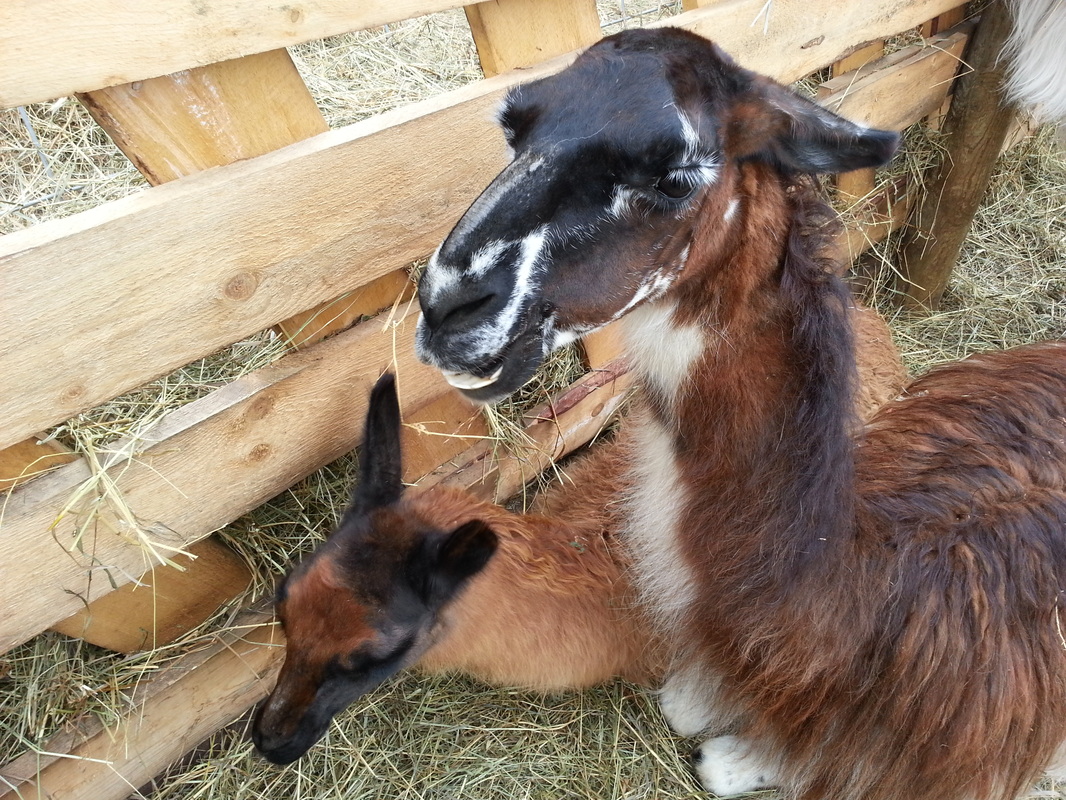I have had sheep from other farms, sheep that were conventionally raised, fed grain and hay and routinely chemically dewormed. Most of them do not fare well on this farm because they do not adapt to the grass fed and herbal model. They need to have chemical interventions for worms and they are thinner than the other sheep. I attribute that to the rumen being accustomed to grain from a very early age. Different bacteria are required to digest grain. Perhaps once the flora of the rumen is populated, it is difficult for the sheep to adjust to grass only in a forage based system.
The Nubian goats that I purchased, two does, are not a hardy breed, but one is doing much better than the other. I don't know of their history, but they came with a lot of worms which they brought to the farm. There are worms on every farm, but this year, it was moister than most and the worms were overly abundant here. I tried the herbal wormers on the goats, but they did not want to eat them. They, too, were grain fed as well as hay fed. One goat is adapting better to the grass fed diet and has started to eat the herbal concoction on her own, but not the other. Today I gave the llama and the goat a hefty injection of Ivermectin, a worm specific medication, and 2 cc's of a vitamin cocktail, particularly high in B vitamins. If Lucy and the goat, Matty, are carrying a heavy wormload, it will wear the animals down and then they are susceptible to illness.
My conclusion after the three years of farming, is that some breeds and even certain animals within the breeds fare much better on an organic farm than others. Certainly those raised on the farm are doing much better than those that came to the farm as adults. The Tunis sheep also was raised on a conventional farm with good hay, alfalfa and pellets and grain. She was fat when she came but she is on the thin side now. Yet her lamb, born here, is doing very well. One might speculate that the difference is breed specific and certainly to a large part it is, but there is more to it than that. The East Friesian sheep I had needed a whole lot of human intervention for everything, especially lambing. I don't have them anymore. The Jacobs, Icelandics, Babydolls and Shetlands are wonderful. They remain healthy on a forage based system, fend off parasites on their own and the herbal dewormer seems to be all they need as a booster, and they grow well without interventions. They lamb easily too.
In conclusion, I am thinking that I have tried quite a few breeds of animals on the farm now. The Nigerian Dwarf goats are hardy little beasts and do well. The sheep breeds I mentioned, also do well. There are a few more sheep breeds I would like to try. I gave Angora goats a go, and whoa, they need way more interventions than I am prepared to offer. I kept one that appears to have some good genes, can raise a kid on her own, rather than abandon it, and fares well on forage. The others no longer are here. I was hoping that the Nigerian blood in they Pygoras would help them, but more of the Angora genes are showing up than Nigerian. I would like to cross the Nubian does with a Nigerian buck thinking that the hybrid vigor would improve the Nubian's stamina too. Next year maybe. First off, is to get the goats well, and Lucy Llama. She is a sweetheart and has a little cria, Audrey. Audrey is thin, likely because Lucy is thin, so I treated Audrey as well. Worms are passed to babies through milk and she is still nursing.
When I signed on to farm, the though of deworming had never crossed my mind. I did not think about dealing with sick animals, thinking that if my protocol was followed, they would be well and not need to be treated for anything. I did not take into account the former lives of the animals and the impact it might have on their switch over to organics. There is little data out there regarding that topic.
I am hoping the critters will all bear the cold and stay well enough, not only to pull through, but to thrive. In the old days animals did not have heated barns. They were different animals than today. I am wishing to breed these hardier animals by choosing those who thrive and keeping only those. I have a few more years to see if it works. Wish me well.


 RSS Feed
RSS Feed